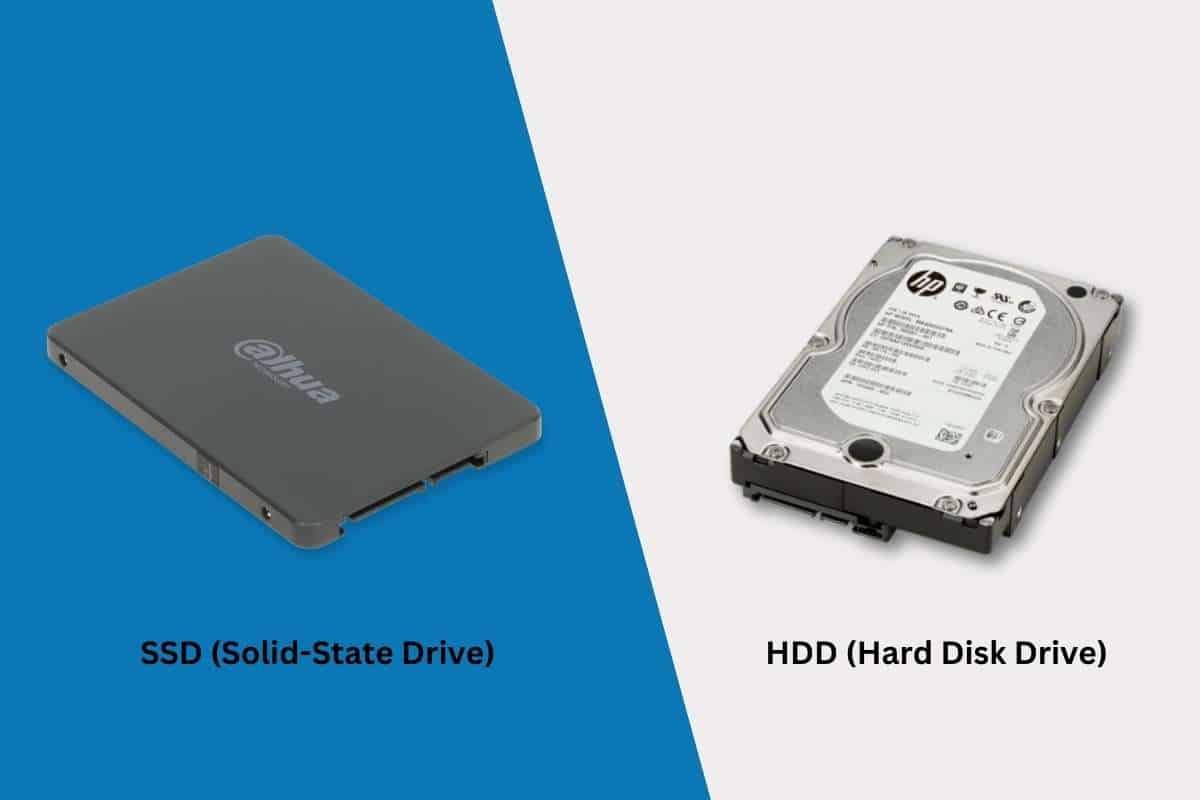All the tech peeps out there, remember the good old gaming days? A period when downloading a new game used to take forever. Laptops used to be large and heavy, unlike the thin and light ones we have now. And everyone remembers the frustration of a download freezing at 99%. You would know the struggle if you grew up in those old-school days. Back then, hard drives were slow, and booting up a PC was daunting.
Strange how times have changed drastically. Things can be done with a snap of our fingers. Computers boot up in seconds, and everything loads instantly. This phenomenal transition is due to the evolution of SSDs. So, traditional hard drives are outdated? An SSD drive and a hard drive both have a set of advantages. Choosing the right one completely depends on your line of work. This article will provide a detailed understanding and help you figure out which one to choose.
Table of Contents
What is an SSD Drive and A Hard Drive?
Storage drives are responsible for storing everything from operating systems to personal files on any computer. Traditional hard disk drives (HDDs) have been the standard for decades, using spinning magnetic platters and a mechanical arm to read and write data. This design, although functional, has limitations: moving parts may wear out over time, and accessing data is slower than with modern alternatives.
Solid-state drives (SSDs) represent a newer technology that utilizes flash memory for data storage. Unlike HDDs, SSDs do not have moving parts, making them significantly faster, more durable, and energy-efficient. Their growing popularity has revolutionized various applications, from gaming to professional workloads, as users increasingly seek speed and reliability.
What are the various form factors for an SSD Drive and a Hard Drive?
Storage drives are available in various shapes and sizes. The most common types are:
- 2.5-inch SATA SSDs and HDDs – Standard size for laptops and some desktops.
- M.2 SSDs – Small, stick-like drives that fit directly into the motherboard.
- NVMe SSDs – The fastest type, using PCIe lanes for ultra-high-speed data transfer.
- 3.5-inch HDDs – Larger mechanical hard drives are mainly used in desktop computers.
The Pros And Cons of An SSD Drive and a Hard Drive

| Feature | SSD (Solid-State Drive) | HDD (Hard Disk Drive) |
|---|---|---|
| Speed | Much faster | Slower |
| Capacity | Smaller (up to 4TB) | Larger (up to 16TB) |
| Cost | More expensive | More affordable |
| Durability | More shock-resistant | Prone to mechanical failure |
| Power Use | Lower consumption | Higher consumption |
Why Are SSDs Ideal for Laptops?
As we know, laptops rely on efficiency, and SSDs are crucial in improving their performance. Since SSDs consume less power, they help extend battery life. This allows users to work or game longer without constantly plugging in. Additionally, their lack of moving parts makes them more resistant to physical shock. This is an essential feature for devices that are frequently carried around. If you’ve ever had a laptop’s hard drive fail after an accidental drop, an SSD would have saved you from that nightmare.
Also Read: Don’t Sweat It! The Perfect Stand for Laptop Computer
How Much Faster Are SSDs Compared to HDDs?
SSDs are all about speed. The usual pace at which HDDs read and write is between 80-160 MB/s. Standard SATA SSDs can reach up to 550 MB/s. More advanced NVMe SSDs push speeds well beyond 3000 MB/s, making them exponentially faster. This difference is immediately noticeable. Computers boot up within seconds, files transfer almost instantly, and applications load without frustrating delays.
SSD is an upgraded and the best option for professionals working with large video files, photographers editing high-resolution images, or gamers as they require the fastest load times. Even for everyday users, the speed of an SSD makes tasks like web browsing, opening documents, and installing software feel seamless.
Lifespan of SSDs

A common concern with SSDs is their longevity, given that they have a limited number of write cycles. While this was a valid issue in their early days, modern SSDs have greatly improved in durability. Most high-quality SSDs now last just as long as, if not longer than, HDDs, with many offering lifespans that can stretch well over a decade under normal usage. Wear-leveling algorithms and advanced flash memory technology ensure that SSDs remain reliable for years.
Capacity Differences Between HDDs and SSDs
What is the capacity difference between an SSD drive and a hard drive? HDDs still have the upper hand when it comes to storage capacity. A standard HDD can range from 500GB to a massive 16TB, making it the go-to option for users who need to store large amounts of data, such as video editors, archivists, and server administrators. SSDs, on the other hand, typically range from 120GB to 4TB, with higher capacities becoming more expensive. While 1TB SSDs have become relatively affordable, they still don’t match the price-per-gigabyte value of an HDD.
Price Differences Between HDDs and SSDs
Cost remains one of the biggest factors in choosing between an SSD drive and a hard drive. HDDs are significantly cheaper, especially for larger storage sizes. A 2TB HDD, for example, costs much less than a 2TB SSD. However, the declining cost of SSDs means they are becoming a more viable option for everyday users, particularly for those who prioritize performance over storage space.
An SSD Drive And A Hard Drive: Which Is Better for Gaming?

Choosing between an HDD and an SSD can significantly affect a gamer’s gameplay experience. Many modern games feature expansive open worlds that require rapid data access, and SSDs drastically cut down on load times, ensuring smoother gameplay. Some professional gamers even swear by NVMe SSDs to eliminate potential performance bottlenecks. While HDDs can still store games effectively, the wait times can be frustrating, especially for AAA titles with large file sizes. If gaming speed and responsiveness matter to you, an SSD is clearly the best option.
Also Read: The Best Gaming Websites for Gamers of All Levels
Which Drive Is Best for You?
Choosing between an SSD and an HDD depends on your specific needs. If affordability and large storage are your priorities, an HDD is the better choice. However, if speed, durability, and energy efficiency are more important, an SSD is a worthwhile investment. Many users opt for a combination: an SSD for the operating system and frequently used programs and an HDD for bulk storage.
Who Benefits Most from HDDs?
HDDs remain the best choice for those who need high-capacity storage without spending too much. This includes photographers, video editors, businesses that store extensive databases, and casual users who just need a place to store music, movies, and documents.
Summing UP
The choice between an SSD drive and a hard drive comes down to your priorities. An SSD is your best option if you need speed, durability, and energy efficiency. If you’re looking for affordable, high-capacity storage, an HDD is the smarter option. Many users strike a balance by using an SSD for performance and an HDD for mass storage. Regardless of your choice, upgrading your storage drive can significantly enhance your computing experience.
FAQs
1. Is a 256GB SSD better than a 1TB hard drive?
It depends. If speed is your top priority, a 256GB SSD will make your computer much faster. However, if you need more storage for files and games, a 1TB HDD is the better option.
2. Which lasts longer, an SSD or HDD?
Both can last for many years, but SSDs tend to be more durable since they lack moving parts. HDDs, however, can technically last longer if they aren’t subjected to physical damage.
3. Is it worth getting an SSD instead of an HDD?
Yes, if performance and reliability matter to you. The speed boost alone makes SSDs one of the best upgrades you can make to a computer.
Also Read: Blockchain for Gaming: Revolutionizing the Digital Playgrounds










